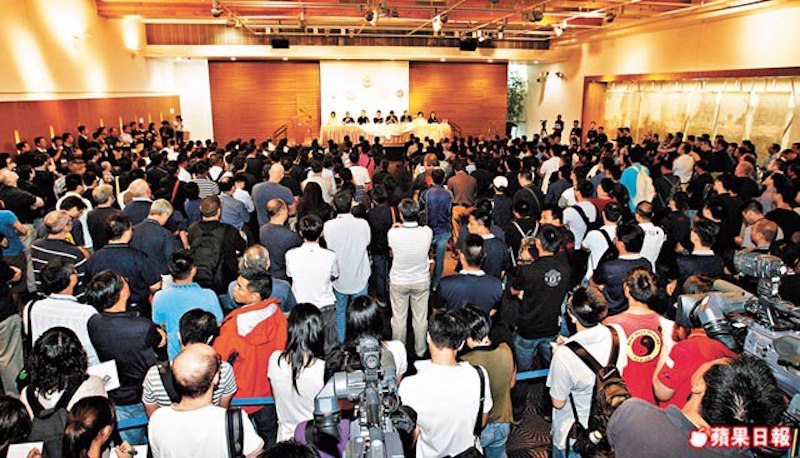On Wednesday, more than 38,000 police union members and their relatives attended a rare rally in support of seven police officers found guilty of assaulting pro-democracy activist Ken Tsang during the Occupy protests in 2014.
The crowd demanded “justice” and “dignity.” They also called for the criminalisation of insulting police.

The assembly marked the third collective action by police in 40 years. HKFP looks back on the other gatherings:
1977: Corruption crackdown
In 1974, the colonial government established the Independent Commission Against Corruption (ICAC) to tackle widespread corruption in the city.
Corruption in the police force was common at the time. The force had close ties with triad groups, with officers turning a blind eye to criminal activities committed by triad members.
Following an anti-corruption campaign by the watchdog, many police officers were arrested. Fearing that they might be next, thousands of officers and their families gathered at the Police Headquarters on October 28, 1977 to express discontent with the crackdown.

After the rally, more than a hundred officers stormed into the ICAC headquarters in Admiralty as they passed by the building, local broadcaster ATV reported at the time. They assaulted some ICAC staff members, injuring five.

Police officers demanded then-governor Murray MacLehose exempt from prosecution officers involved in corrupt activities who had not yet been investigated on January 1, 1977.

Following the police-ICAC clashes, MacLehose gave in to their demand, though he told the legislature that the government would not make another exception.
Among those who barged into the ICAC headquarters, one retired officer was sentenced to three months in jail for assault and participation in an illegal assembly. Nine police officers were dismissed following disciplinary hearings.

Former ICAC chief investigator Stephen Char Shik-ngor, who witnessed the clashes, told the Chinese University’s U-Beat student magazine in 2013 that the amnesty hugely disappointed anti-graft officers.
“It was injustice. My colleagues and I thought it was unfair to the officers who were not corrupt,” he said.
In 2015, the police force came under fire after it said on its website that low wages were the main reason for police corruption before the 1970s. It said officers and society believed the corruption crackdown “crossed the line,” as some forms of corruption were widely accepted.

2009: Independent pay scale
In 2009, four major police unions campaigned for a pay scale independent of that of the civil service, after the government proposed freezing salary adjustments for civil servants.
After negotiations with the government failed, the unions threatened to take to the street. Then-police chief Tang King-shing cut short his overseas trip to meet with the union leaders and asked police to fight for their rights through “reasonable means.”

The unions eventually agreed to cancel the rally. In place of the protest, they held a members’ consultation session at the Police Headquarters on June 28, 2009.
Around 2,300 union members attended the event. Tang promised to convey their demand to the government.
Although their demand was not met, police continue to be better paid than their counterparts in other disciplined services. Their starting salary is also the highest among all disciplined services.

Hong Kong Fire Services Department Staffs General Association Chairman Nip Yuen-fung previously told Apple Daily that the police force enjoys more privileges than other disciplined services.
“Though there is no written rule saying that resources are prioritised for police, the government is usually less stringent when it comes to security issues and so the police get resources they ask for much more easily,” Nip said.
“In comparison, we need to write long reports and go through a lot of negotiations before the government approves our requests.”
